A Norwegian-Canadian takes a look at the similarities and differences between his two countries.
Norway is often compared to Canada because of its northern latitude, focus on winter sports and general happy clappy lifestyle. But how true is that? Who better to compare Norway with Canada than someone who holds double citizenship of both countries? Take it away, Daniel…
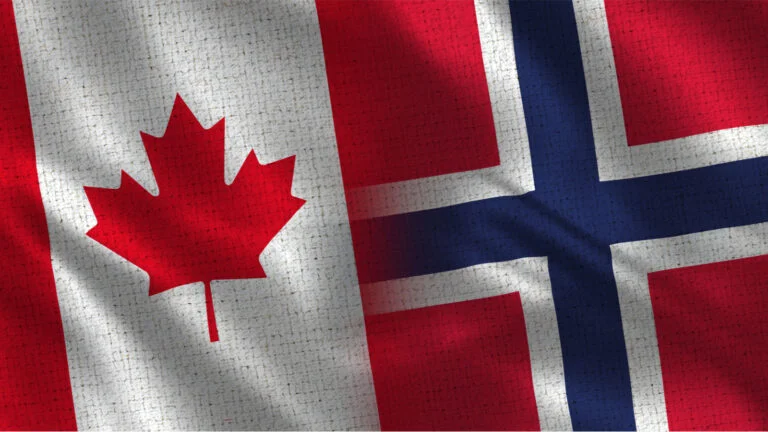
Canada and Norway have this in common that they generally get less attention than their bigger neighbours to the south. This is perhaps why I get asked so often by people from either country what the other one is “really like.”
The similarities between the two countries range from the expected to the downright bizarre, while the differences might surprise you.
Table of Contents
Quite similar, yet different
First let’s get the obvious out of the way.
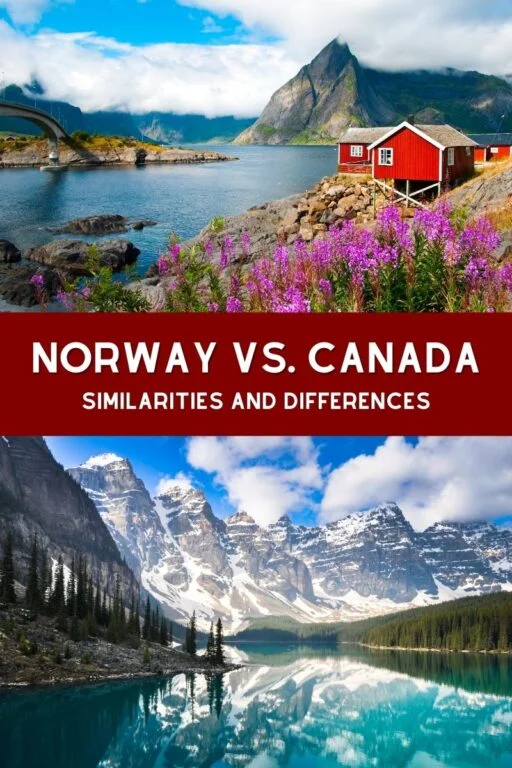
Both countries are constitutional monarchies. Norway has its own king, while Canada piggybacks on the British royal family. Both extend quite far up north, and both have generally favorable reputations on the international stage.
It’s hard to make generalisations about the climate – because Norway is large and Canada is enormous – but as a rule, one can safely say that most large cities in Canada have harsher winters and hotter summers than most large cities in Norway.
Read more: The Weather in Norway
Vancouver is an exception with its mild winters, and Halifax is probably the Canadian city with the closest climate to Oslo’s.
In short: both Norwegians and Canadians are used to changing seasons, snow, winter tires and a general collective obsession about the weather. I’m looking at you Canadian TV channel dedicated solely to the weather and Norwegian newspapers making front page news out of a nice summer day…
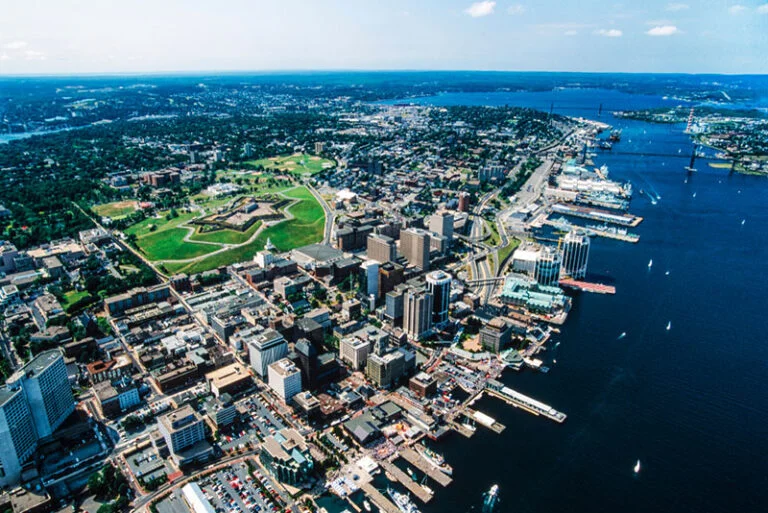
One notable difference is in the appreciation of good weather. Big-city folks in Canada know the exhilaration of the spring’s first warm day, with outdoor serving areas packed to the brim and a collective feeling of euphoria (fueled by pitchers of sangria, no doubt).
In Norway, you get that feeling of excitement all summer long. The country’s dark winters and generally cooler summer temperatures mean that every beautiful day is enjoyed as if it were potentially the year’s very last. When it comes to sunny days, Norwegians take nothing for granted and seize the moment.
The welfare states of Canada and Norway
The “welfare state” is how Norwegians describe their top-notch social safety net. Neoliberalism has made that term a charged one in Canada, but the system itself lives on.
The Canadian social safety net is quite good albeit not as generous as its Norwegian counterpart. That being said, Norwegians are often surprised to hear that Canada has socialised health care (without even a deductible for a visit to the doctor, as is the case in Norway).
Read more: Equality and the Nordic Model
One area where Norwegians are the clear winners is equality. The income gap between the top 20% and the bottom 20% is smaller in Norway than in Canada and The Global Gender Gap Index 2021 places Norway (in 3rd place) far ahead of Canada (in 24th place).

The cost of living
Equality comes at a price, of course. When you afford restaurant workers living wages, your burrito will be more expensive.
Add to that a higher sales taxes, the after-effects of the oil boom and the fact that most things need to be imported and you get eye-watering prices.
That being said, while the cost of a trip to Norway might shock the average Canadian, living in Norway with a Norwegian wage is quite comparable in terms of purchasing power to living in Canada with a Canadian wage.
The exception is the people at the lower end of the wage scale, who are, as explained previously, better off in Norway.
Work-life balance
Purchasing power is not everything, though. When it comes to work-life balance, Norway is in a class of its own.
Annual vacation (a whole five weeks of it) is the standard in Norway, compared to a pitiful two-week minimum in Canada. It is also generally understood and expected that people go home when the day is over, and probably won’t respond to emails off-hours.
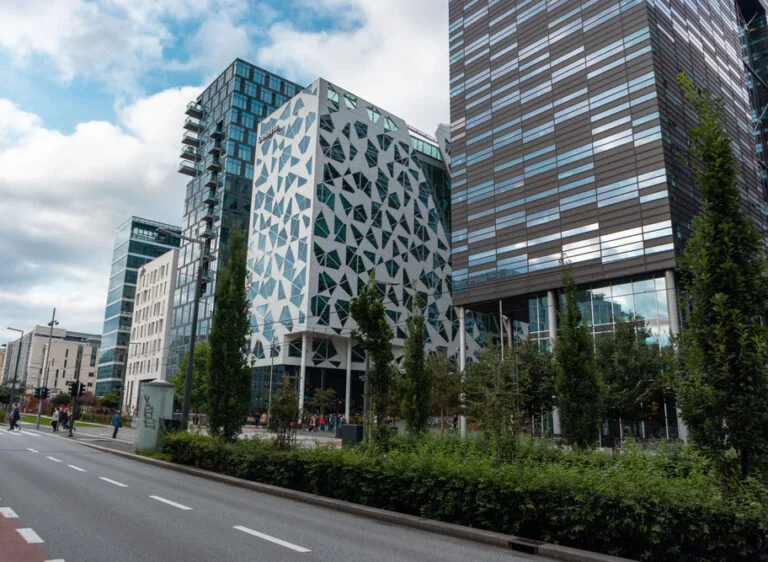
Norwegian law actually states workers should have every other Sunday off, at least on average (yours truly had none for at least a couple of years in a row in Canada).
In short: Norwegian society understands the value of time off, and that more hours doesn’t always equal more productivity. They might be onto something, looking at how they beat Canada by a comfortable margin on the productivity index.
Norwegian food vs. Canadian food
Sorry fellow Norwegians, but someone has to say it: you don’t come to Norway for the food. Unless you’re absolutely loaded, as both countries have outstanding tables at the high end of the price bracket.
Norway is increasingly cosmopolitan, but not nearly as much as Canada, built on immigration for centuries. More cultural diversity means more food diversity. Lower prices mean it’s easy and fun to sample food from all over the world in Canadian cities like Montreal.
Add to that the almost irrational love Norwegians have for their matpakke, and you get a country where eating out is not something you do every day. Certainly not on a lunch break, which typically lasts just 30 minutes in Norway.
Now before I get assailed by hordes of angry Norwegians, I must make myself clear: I’m not saying there aren’t any good places to eat in Norway.

What I’m saying is that if you pick a restaurant entirely at random, it’s much more likely to be disappointing in Norway than it is in Canada. Filtering by price doesn’t even help, as a high price in Norway (even when considering prices on the Norwegian scale) is no guarantee of quality.
There is progress though. Norwegian craft beer and artisan cheeses, for example, have exploded in popularity.
Bland meat dishes served with boiled potatoes and overcooked vegetables are a less common sight now than they were 20 years ago. Variety is also increasing. Just be prepared to encounter countless burger, pizza and sushi places and not so many Korean ones.
The weird case of the potato dumpling
When it comes to traditional food, “meat and potatoes” dishes are found in both countries. It should not have come as a shock then (but it did) to discover that a dish I knew as a local Acadian specialty (Acadians are a French speaking minority in Eastern Canada) existed in Norway.
The dish is a very dense potato-based dumpling, often containing a little pork meat at its centre. It’s called poutine râpée in Canada and raspeball (among other names) in Norway.
The food… still
Supermarkets are another area where Canada comes out on top. There are many complicated reasons for this. The variety of fruits and vegetables is just not there.
As many foreigners have experienced at one point or another, some ingredients assumed to be pretty basic are hard to come by. Think green beans, corn on the cob (not the objectionable vacuum-packed variety), cucumbers (other than the “English” kind) etc.
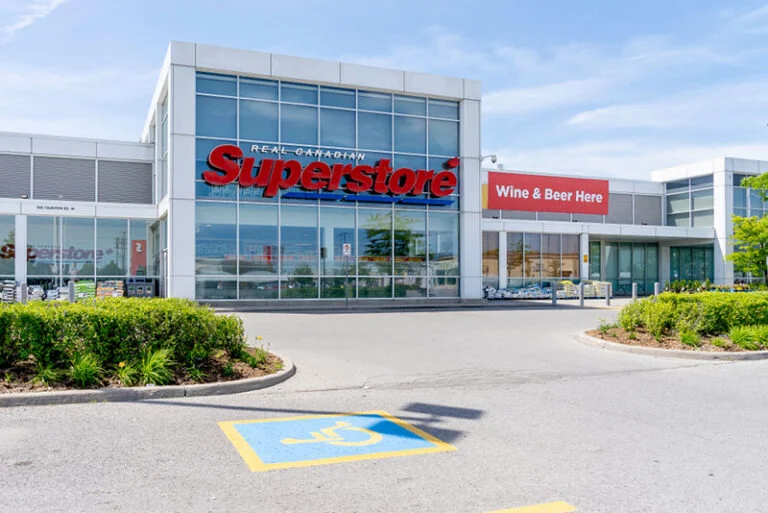
That being said, one point where Canada lags way behind is when looking at the number of supermarkets.
There might be less on sale within Norwegian supermarkets, but there are certainly more of them and they are very conveniently located, usually a short walk away.
This is a clear win for Norway compared to Canada, where even in large cities one has to drive or use public transportation to do grocery shopping.
The outdoors
You’ll find great hiking spots and out-of-this-world vistas in both countries. Canada has its Rockies and Norway, its Western Fjords (though you may be surprised to learn that Canada also has fjords).
What Norway has that Canada lacks though, is a general understanding among most people that hiking is good for both body and soul, regardless of your age. They don’t even call it hiking here. They just call it going for a walk (my loose translation of “å gå tur”).
While in Canada, hiking trails are (mostly) confined to national/provincial parks, in Norway they’re everywhere. Not only that, they are cherished, well maintained and heavily used.
Both countries share a love of fishing and hunting, though in both places there seems to be a decline in the popularity of these activities, with fewer young people interested in taking up the hobby.
This Norwegian understanding of the value of physical activity gives them an edge throughout their lives. It’s a common sight in Norway to see old people, even those with mobility issues, walking to the conveniently located supermarket. In Canada, people in the same situation would almost certainly drive.
Sports in Canada and Norway
It’s difficult to explain to a non-Canadian how important hockey is to the country (I am, of course, talking about ice hockey here. In Canada the mere idea that this needs to be specified hasn’t crossed anyone’s mind).
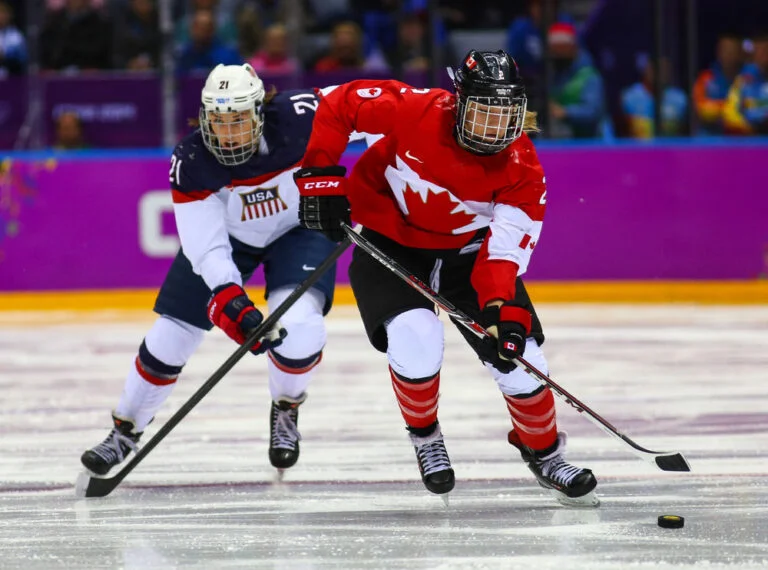
Hockey to Canadians is to all intents and purposes a religion. In fact, it’s one of the few things all Canadians have in common, regardless of language or ethnicity.
Norwegians get excited about cross-country skiing in its various incarnations (including the very popular biathlon), they all have a favourite soccer team (often a British one, weirdly) and they love handball (yeah, really).
But none of these sports even come close to triggering in them the passions that the Stanley Cup playoffs (or an Olympic gold medal final against the US) will elicit in Canadians.
What the Norwegians do have though is excellent sportsmanship and the reputation of being top-notch supporters to foreign athletes when they host skiing competitions.
And finally…
Disclaimer! This article is an opinion piece, absolutely not scientific, and it’s perfectly okay and expected that other people will have other opinions.
Also I haven’t lived in Canada for over ten years so my picture of how things are over there is almost certainly outdated. But I can say with no reservations that I love both of “my” countries, and that they both are among the best places to live in the world.

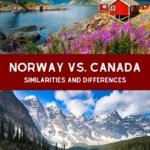

Hey Daniel, flott artikkel!
I’m a fellow Canadian-journalist-turned-Norwegian. I’m pleased that you mentioned that Canada actually has cheaper healthcare than Norway; Norwegians are soooo smug about their social-safety net.
I’ll point out two other areas where I think Canada comes ahead. First, while I agree with you that Norwegians are more ACTIVE in nature, Canada’s nature is more … natural. I came here from Northern Canada, where the wilderness is still boss — full of critters, untamed, dangerous. Norwegian nature is comparatively tame. Whenever anyone suggests bringing wolves or bears back to Norway, or whales and seals back to the fjords or whatever, Norwegians are terrified by the prospect. It’s sad.
Also — and this relates to cosmopolitanism, probably — Canadians are more open-minded. Norway, by comparison, feels stuck in the 1950s, with parochial, localist attitudes. At least in my experience.
Hey Aaron,
You’re right, we could write a separate article about the differences in perception between the two countries when it comes to nature. I remember seeing “kulturlandskap” (cultural landscape) areas on a map and thinking it was a sort of conservation thing. It is, in a way, but not in the sense you would expect. It means letting some sheep loose to prevent forest regrowth (and keep the landscape the way it was in 19th century paintings). Ok it means more than that but that’s the gist of it. Trees growing in disused agricultural areas are seen as a national tragedy it seems (even outside of the “kulturlandskap” areas).
Hi Daniel, love your article. Just one thing though, I assume you’re not from the West Coast?
Another thing I would like to point out, maybe you’re not aware of the ongoing decolonization. When you said Canada is a “meat and potatoes” country in terms of traditional food, it is inferring Eurocentrism. Perhaps a better and more correct way of phasing the idea can be “traditional foods of the early settlers…”
Hey Kaylan, thanks for your comment 🙂 You make a very good point. I toned down the sentence a little bit. I could have actually written a completely separate article just on the concept of “traditional food” in Norway and Canada. The thing is, in the Norwegian sense, Canada just doesn’t have a “traditional cuisine”. When Norwegians ask me “what do people eat in Canada at Christmas”, they expect a neat list of 3-4 options. What they get from me is a much fuzzier “it depends on the family really” reply. Because it does. And that makes things all the more interesting.
Since multiculturalism is still a relatively new concept in Norway, I can see why they’re a bit confused 😆. Trudeau said he believes the future of Canada is to one day have no core identity and mainstream culture. I remember on the podcast of Life of Norway the Canadian diplomat said something similar. It only makes sense for the traditional Canadian cuisine to be like a smorgasbord instead of a melting pot.
Actually have travelled trough Norway and I observed that the most fjords aren’t at all. They were dangerous, slippery and we had a hard time finding a fjord which was climbable. Finally we had to climb something which was very small. But in Canada the mountains are very well maintained because most of them are in National parks.
Fjords and mountains are different things…
…as are hiking and climbing 😇
Just to let you know that here in BC, we have amazing hiking trails. “Rails to Trails” where no motorized vehicles are allowed, are well groomed and run entire lengths of valleys and places in between. For the more adventurist there are mountain hiking trails and backcountry cross country trails. Mountain biking is also huge here. Winters are filled with skiing and snowboarding while summers, the great beaches are enjoyed, along with tubing (rafting) down our rivers.
Great article!
What’s your impressions on Health care in Norway?
My family lives in New Brunswick, born and raised here – but our health care is really in trouble (one of the worst in the country, if I remember right: 16+ months wait times for hip surgery). To add even more issue with that, our health care in Canada is ranked 10th out of 11 countries, meanwhile Norway is ranked 1st. To me, this sounds like Norway obviously takes the point for Health Care – just wanted to hear what you and others had to say.
Hey fellow New Brunswicker 🙂 (Though to be fair I haven’t lived there in a long time)
I think it’s fair to say that both the Canadian and Norwegian health systems are among the very best in the world. Canada’s advantage is that it’s completely free. In Norway, you pay a fee for a visit to the doctor. It’s still largely symbolic compared to the actual cost, but it’s not zero. A stay at the hospital is free in both countries. Norway wins when it comes to public insurance covering the cost of prescribed medicine (those systems vary widely in Canada with some provinces having little to nothing). That being said, over-the-counter medicine is generally much cheaper in Canada.
I’m fortunate enough not to have been hospitalised anywhere so I can’t say anything about that. But my experience of both systems has been largely positive.
Hello, bonjour Daniel,
Interesting article.
I am a canadien, born and raised in quebec and moved to Alberta, Canada. Ive live in different place of Alberta since I moved here with friends on a trip when I was 17. There are few important things that I think should be mentioned.
First Quebec should be distinguished from the rest of the country. Its very different as much the general mentality, beliefs, politics, weather and traditions. In quebec when I grew up, last names were important. It was used to know the backstory of people. Parents would ask their kids : “What’s your new little friend’s last name ?” to know if they were good or bad influence. Which had some benefits but lead to instant judgement in some circumstence too.
Quebec has very old french villages with museums, cheesery and “érablière” where people gather in march to eat maple sirup on snow. They also put cheese and maple syrop in many dish and some say in everything. I used to do so when I lived there.
The “poutine” with made in quebec cheese is also an addiction for what they call “true Québécois”. Quebec is liberal , Alberta is definitely conservative. Albertans dont have traditionale food its very multicultural.
After I traveled through Alberta I realized how much its boring compared then quebec but thats what I like these days haha. In quebec arts and music is everywhere. There is art on building walls, bridges, fences, house walls and music stores in every city. Its not that popular and present in other provinces.
Everywhere in Canada its diffucult to rent a place to live when you have pets and its sometimes required to fix them. If you adopt from a dog shelter they will automatically be fixed or spayed. I heard in Norway its illegal to fix you pets.
About the health care. Alberta is completely different than Qc. In quebec Ive spent many times over 20-24 hours sitting in a chair in a waiting room full of people sick at hospitals. You dont see that kind of things in Alberta. The worst Ive seen here is 3 hours in the flu season. I woukd like someone to mention also the difference in the quality of service. In quebec its normal to be mistreated, dississed even insulted by nurses and doctors. People there and especialy in the health/social care system are extremely rude.
The first time I live in Alberta and went back home in quebec, on our way we stopped at a gas store and I had such a shock on how the cashier responded to me that I cried and I said I dont want to go home. In Alberta when you work in public its part of the job to ask customers “how is your day” or “how are you”. Politeness is very important. In qc its the opposite everyome seems angry and you just have to keep your calm.
Mental health services are bad in both provinces but worst in QC. In alberta there are free Emergency mental health clinics for people on welfare. They assess you and if they categorize you as needing the service you can receive few appointments with the psycologist thorough the year with only couple weeks waiting.. In qc there is often 2 years waiting list for any mental health professionals or any health related appointment. When my aunt was diagnosed with cancer she was told she had to wait 8 months to see an oncologist and start treatment. She went private thankfuly she could afford it after selling everything.
My biggest deception for every articles Ive read about canada is that it always mentions the free health care but never the real cost of this.
Ive been chronically ill with no diagnosis my whole life so I have been to the dr a lot and they just dont care. They want to get you out of their office as fast as they can. Visits are 15-20 min max per patient and if they cant figure out by this time they just tell you oh well there is nothing we can do good luck !
Im in many support groups in us and canada and its recurrent that people in canada living with difficult or chronic disease are angry at the health care system for letting them down.
Young disable people are seen as lazy and disrespected in canada but more so in Qc. Invisible disability are tough anywhere but I have certainely be a lot more judged in qc even with a healthy weight.
What book would you recommend as a touristic guide or about culture of Norway ?
I hope one day I can visit this beautiful Country, I feel like I would be in my element.
Thank you !
Thank you for this insightful article! I have always dreamt of visiting Norway. I am Canadian from Quebec, and I think you would find more similarities with Norwegians in our culture. Firstly, cross country skiing is very popular here, and we love the outdoors, especially wilderness camping, no matter the weather. Like Norway, we have many trails outside of the national and provincial parks. But hey, the majority of French Canadians originate from the Bretagne and the Normandy (“the land of the Norsemen”), so perhaps some things are genetic. I am first generation German, and often spend time there, but I suspect Norway will be closer to the culture with which I was surrounded. A note that the French Canadian culture is very family oriented, with multiple generations often enjoying outings and home parties, unlike much of the rest of Canada. Again, just based on my personal experiences in Ontario and BC.
Interesting article. I moved from Canada to Norway a couple of months ago to work here, so I’m adapting to Norway now. I mostly lived in Ontario, but also in Nova Scotia, the Yukon and the NWT. For some reason I miss the NWT the most, despite having lived there for only a few months. The Yukon is somewhat similar to the NWT, I’ve lived there for several months, it has very eye-candy mountains, and Whitehorse seems to be a bit more “cosmopolitan and international” than Yellowknife. A very nice place to live also, but my preference for some not-so-easy-to-clearly-explain reason goes to Yellowknife. And definitely not to Ontario, albeit northern Ontario seems appealing to me, but I only drove through that part of the province (and lived in southern Ontario).
The climate in those parts of the Canadian North might seem quite harsh compared to Oslo’s, but Oslo’s climate is very humid, so it can feel somewhat uncomfortable even at -3, whereas NWT’s or Yukon’s -20 might not really feel “that bad”.
Hey guys,
I’m Iranian and have a normal life in my country. But as I hear from my friends, Canada is a much more better place to live, so I am willing to immigrate to Canada with my wife and two sons and I should apply for Express Entry program that requires so much difficult terms and conditions. Therefor I started learning French to increase my score, even my IELTS bandscore is 6.5, but that’s not enough!
Now my query is: What about learning Norwegian and aiming at immigrating there, instead of focusing on Canada?
Is it a privilege to know Norwegian before I enter Norway in order to have a better situation for working there?
Actually, I’m going to invest at least 18 months of my life to learn a new language (French or Norwegian) for achieving a residence or at least a work-permit, and that’s not a little at all. Nothing is more precious than our time.
Note that I have a MSc in civil engineering.
I’ll appreciate your generous advices.
Interesting read, I’m also a dual citizen in Norway and Canada.
I have lived 18 years in Canada.
I think your article is very accurate.
While I find Canadians way more friendly and open than Norwegians, I do however find it harder to really get to know someone in Canada. If you get to know Norwegians they will be your friends for life.
Also Norwegians values simple pleasures more getting together and have it koselig with friends and families. Here is more big deal and more networking exercise at least that is how it is in Toronto. But they are good about hosting community events where everyone is welcome.
What I miss the most about living in Canada is the access to nature and is not the hardcore adventures but just walking trails everywhere and also being in a culture that values that. Again many Canadians are very hardcore outdoorsmen this is not what I’m talking about bud simple outdoors where you live even in the city. Dip in a lake, biking, just enjoying the sunshine on a wonderful day or a brisk walk on a cold winter day.Biking and walking to do errands, etch.
I agree that nature is more interesting in terms of animals in Canada but I kind of prefer camping in Norway where I don’t have to worry about bears.